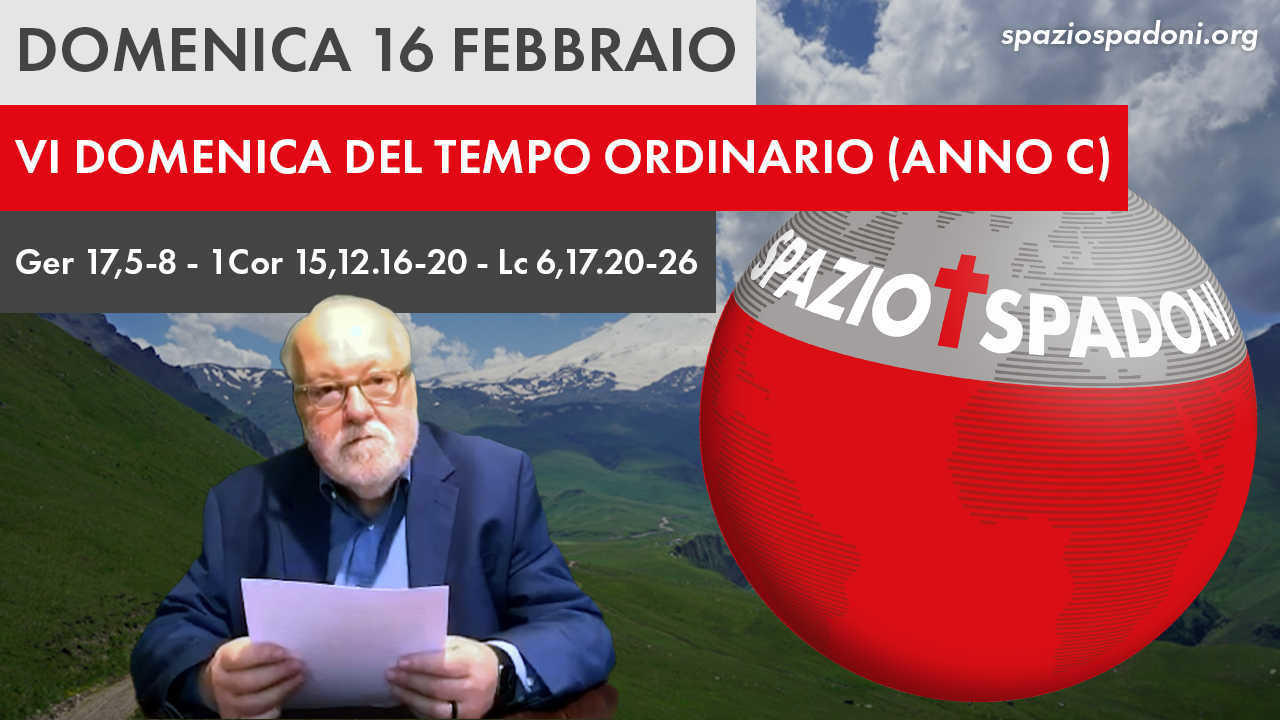
VI Sunday C – Blessed are the poor?
Readings: Jer 17:5-8; 1 Cor 15:12,16-20; Lk 6:17,20-26
Lord, you have gone too far this time! But have you taken a good look around you? You say “blessed” (“makarioi”), i.e., filled with divine happiness the poor of the whole earth (Gospel: Luke 6:20): and not the usual “poor in spirit,” as we soon say referring to Matthew (Mt. 5:3), but the “poor-poor”: your Gospel uses the term “ptochòs,” poor, which comes from “ptòsso,” covenant (! ) and translates Hebrew words with very concrete meanings: “ani”: the downtrodden, the landless; “dal”: the weak, the one who socially does not count; “’ebjon”: the beggar, the homeless; “rash”: the needy; “misken”: the mean, belonging to lower classes. You present blissful material poverty to us: but they seem to you so happy, so loved by God, those who own nothing, the homeless, the “street children,” the illiterate, the gypsies, those who have no home, who have no freedom, the refugees, the bombed Ukrainians, the Jewish hostages of Hamas, the victims of Israel in Gaza, the exterminated natives in Brazil, the homeless Kurds, the immigrants on barges to the Italian dream, the “vu’ cumprà” crammed into dilapidated attics, the slaughtered by the fanaticism of Islamic jihad? You proclaim blessed are the hungry, “peinòn” (Lk 6:21), in Hebrew “rà’èb”: it is not those who have an appetite, but those who do not have the minimum to live, the “ravenous.” are you sure that the thousands who starve to death every day, the millions who search city dumps or garbage bins every day for the essentials to survive, the inhabitants of favelas and slums all over the planet, gripped by the cramps of an atavistic hunger, are really happy? And do you say blessed are the afflicted, “pèntoi,” in Hebrew “’ebel,” those who are so distressed that they explode their grief outwardly: “those who weep” (“klaìontes”: Lk 6:21). What bliss do you find there in the mother mourning her four-year-old son who died of leukemia, in the bride betrayed by her husband, in the child abused by her uncle, in the condemned man sentenced to capital punishment, in the psychiatric patient, a prisoner of his ghosts, in the neoplastic patient, who groans hopelessly? And then, allow me, Lord: why should your Church be blessed when “hated, banished, reviled and rejected as wicked” (Lk. 6:22), and not instead when your message is accepted by all, your ministers revered as “excellences,” “eminences,” “holiness,” the “Christian culture” dominant, the economic resources for evangelization abundant, the mass media in our hands? Bear with us, but we seem blessed by the very ones against whom you throw your “woes” (“vae”): the rich, the satiated, those who laugh, a Church about which everyone says well (Lk. 6:24-26)…
We cannot cope with this great Revolution that you are still proposing to us today. And if all the poor and suffering people of the earth today can rejoice because you first and only in history have truly proclaimed their final deliverance, which already begins now and which you eternalize in your Kingdom (Second Reading: 1 Cor. 15:12-20), it becomes difficult for us to think that “we already have our consolation” (Lk. 6:24), and that in this immense “Purim,” reversal of fortunes, we are in for the curse and ruin (First Reading: Jer. 17:5-8; Responsorial Sl.: Sl 1). Your terrible “woes” sound like the bitterest condemnation of our social inequalities and at the same time they are an invitation to a strong conversion to always be on the side of the poor, the last, the marginalized, the oppressed, in the real sharing of goods and the experience of suffering, according to the communitarian ideal you propose to us in Luke (cf. Acts 2:42-47; 4:32-37): they are the call to make us like you, Jesus (the Beatitudes “are a kind of self-portrait of you”: Veritatis splendor, no. 16…), the Poor God (Lk 2:11-12), Meek (Mt 11:29), Persecuted (Mk 3:21), Disfigured by suffering (Mt 27) as we contemplate before the Crucified…
